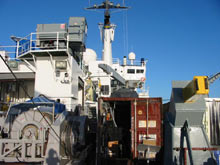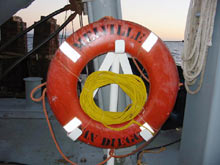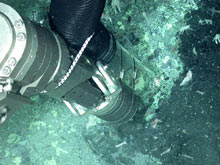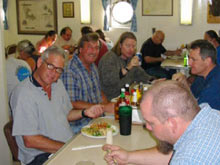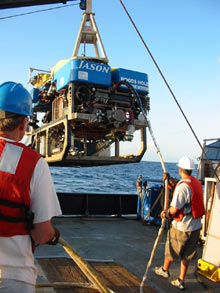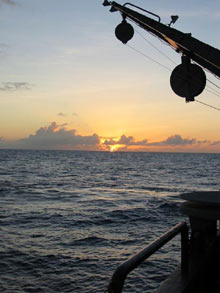The view from the back deck of the research vessel (R/V) Melville, looking toward the bridge. We are prepared for every circumstance with not an inch of deck space to spare. Click image for larger view and image credit.
A life ring on board this research vessel in a "country" I call Melville. Click image for larger view and image credit.
The "Country" Called Melville
April 27, 2006
Lori Savage
Educator at Sea
Rogue Community College Instructor
The experience of a lifetime lay ahead of me, and though my trip had started 19 exhausting hours before, I was ecstatic when we stepped off the plane at the Guam International Airport. My skin instantly became a "clothes magnet" as the hot sticky air outside the terminal permeated every fiber. To me the feeling was comforting, because I've had many memorable travels in tropical climates. The heat was confirmation that the adventure had begun.
What an honor I'd been given. A chance to get involved with hands-on ocean science, work with a remotely operated vehicle (ROV), conductivity-temperature-depth instruments (CTDs), mapping technologies, and scientists, and also to visit two exotic ports of call. These were my expectations, and they all were to come true, all except that last one. I was short sighted. I have since discovered that there are actually three exotic ports involved in this adventure: the third one is the "country" I call Melville.
Yes, Melville is the name of our research vessel, but within its cool steel walls, open decks, and long corridors are two diverse, exciting communities: the scientists and the crew.
From the beginning it was apparent that the science community was a bit strange. Their dialect hinted at it: "The Mariana intraoceanic arc is prime habitat for extremophiles as determined by nephelometric, temperature, and sulfide indicators." But when the actual experiments began, my suspicions were confirmed. If you think about it, how many people do you know that would actually want to park their brand new luxury automobile directly next to potentially active volcanoes and watch what happens? (The Jason ROV is much more valuable than any auto!) And, as if that wasn't enough, the scientists proceed to prod the volcanoes and poke things into them, as if to tempt the Volcano Gods. "I just hope they don't start throwing in sacrifices to get more action out of them. No doubt the teacher would top the list of expendable personnel."
The ship's crew community has taught me a few things as well. Now I know that a 3rd mate hasn't necessarily been married three times, and "going to the head" doesn't mean you're conceited. Even though they confound me with sentences like "Go tell the AB, he's port side on the steel beach," the crew has proven to be a jovial and helpful bunch. They get along well with intruders, and even at hours of the night, when our bodies aren't designed to be awake much less working, they are quick to smile or share a joke. It is obvious that they are dedicated to this country called Melville, bar none.
Like a country, the Melville communities are governed by ultimately dictatorial entities, are bound by common laws (safety first!), and thrive on teamwork. The communities have a common language base, but have different dialects, different goals. Nonetheless, they are all headed in the same direction. Together they make up Melville.
As I sit starboard watching the sun gracefully exit the aqueous stage, the scientists and crew below are working together. Successfully they lower the ROV for yet another dive. I wonder how much of the Melville culture will rub off on me?
Sign up for the Ocean Explorer E-mail Update List.




























